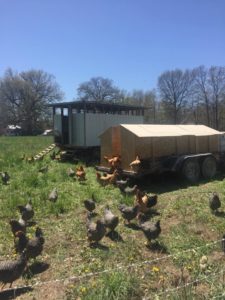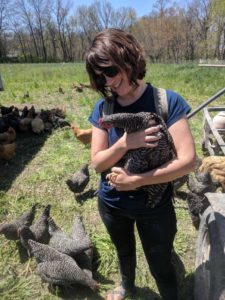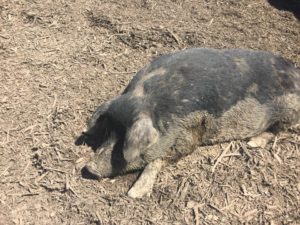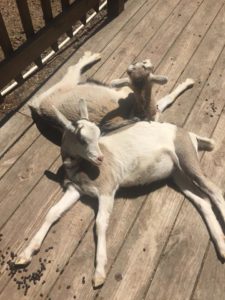Green Finned Hippy Farm
On Sunday, April 29, 2018, a small group of representatives from the St. Louis Food Policy Coalition visited the Green Finned Hippy farm (GFH) in Pocahontas, IL.
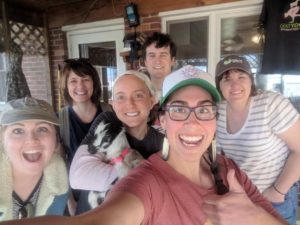
While this region of west-central Illinois is mostly flat, Josh and Alicia, the GFH farmers, have a beautiful slice of land that rolls down from side to side into creeks that the pigs are able to rummage through. This was one of the first beautiful, sunny, warm days of spring – a perfect day to be on the farm.
As we arrived, Josh and Alicia offered a warm welcome and promptly led us to where the baby goats spend their days napping in the sunshine. Before we knew it, baby goats bundled in farm blankets were offered to each of us as companions for our farm tour. My heart was fluttering with excitement. With goats in tow, we proceeded to the chickens just across the way. The beautiful speckled chickens were set up in a paddock with mobile trailers dispensing high-quality feed and providing a cozy, shaded space for roosting and egg laying. I handed off my bundled up baby goat so I could free my hands to learn best practices for picking up a chicken: place each of your hands around the outside of each of their wings and swiftly hoist them up, positioning them to perch on your hand, wrapping their squishy feet around your fingers. With your now one free hand, gently and firmly apply pressure against their chest, providing them a sense of security and ease. These chickens had plenty of space to spread out and lots of bugs to eat. Did you know that eggs labeled “vegetarian fed” mean the chickens that laid the eggs did not have access to roam pasture and eat bugs, the main source of a healthy chicken diet?
We made our way towards the pig pasture, the baby goats still among us, as we came up to a small group of pigs: large pigs, medium-sized pigs, pigs having just rolled in mud, pigs oinking away. Farmer Josh tells us about his passion for these Mulefoot hogs and explains that their farming practices allow the pigs to roam, take in the sunshine, root around in the dirt, forage in the woods, and rotate from pasture to pasture, not returning to a previous pasture until the ground has recovered with fresh greenery. GFH farm has decided not to install nose rings on their hogs as they can inhibit their ability to root. Rooting is a natural behavior for pigs that involves them using their noses to burrow into the ground, turning it over to expose material of interest. GFH farm believes that a hog’s nose is like a person’s hands – it’s how the animal interacts with the world and if they are not able to root, it’s like they are disabled. The Mulefoot hog species raised at GFH farm was once commonly raised and considered the most delicious type of pork. Nowadays, this species is raised by very few farmers, partially due to the smaller litter size: on average they have 8 piglets as compared to around 20 piglets for more prevalent species. GFH farm is passionate about the Mulefoot hog and wants to see this species prevail. One last consideration mentioned by Josh is that they work with a slaughterhouse that uses food to motivate their pigs to move, rather than electric prods like some other slaughterhouses do. All in all, these farmers are passionate about their work and take several steps to ensure their hogs live happy lives and that their farming practices have good impacts on the land, air, and water.
If you’re interested in visiting this farm, they offer Goat Yoga classes, Sips and Cuddles experiences with baby goats, and farm tours. To purchase this farm’s products, you can find them at the Schlafly farmers market once a month, and at drop locations in O’Fallon and Troy, IL. Squatters Cafe in midtown St. Louis also offers items from this farm on their menu. You can also find them on Facebook.

